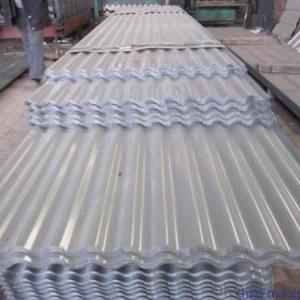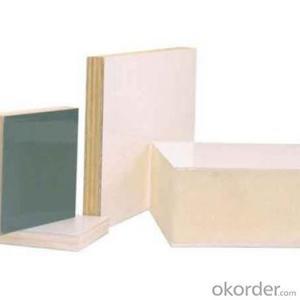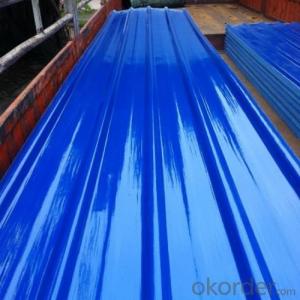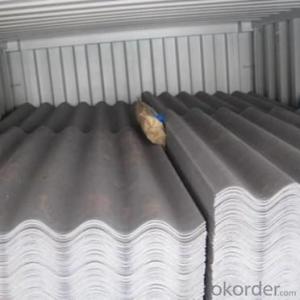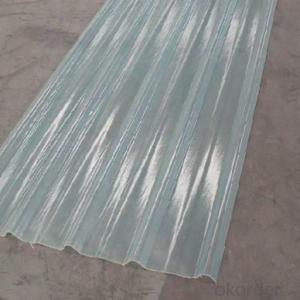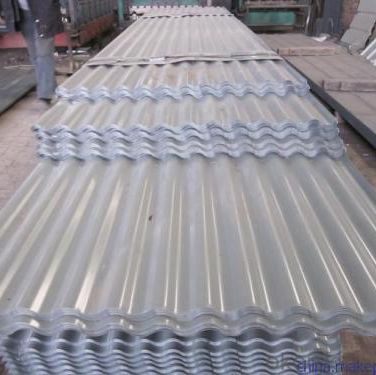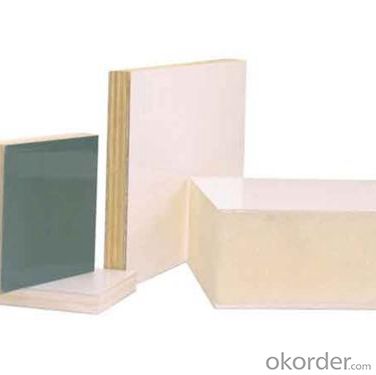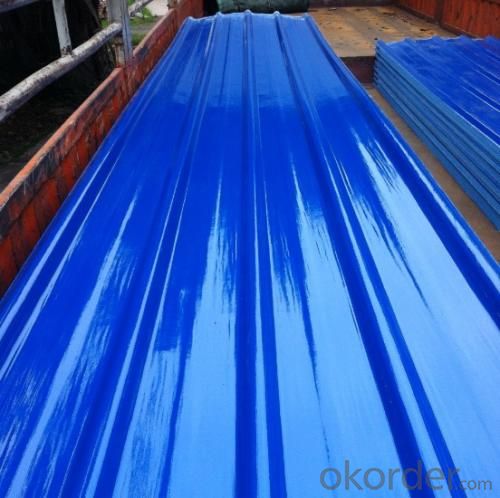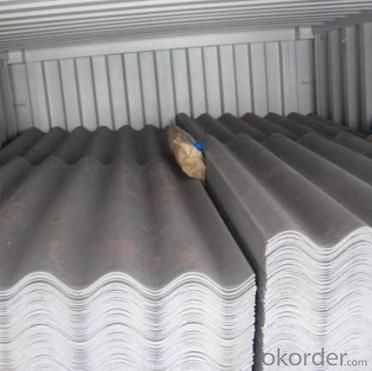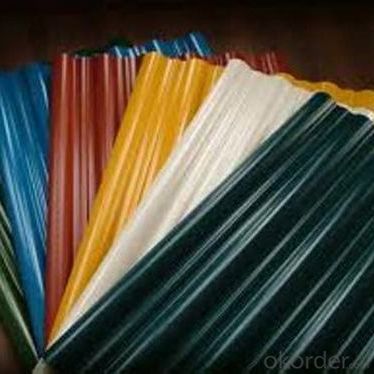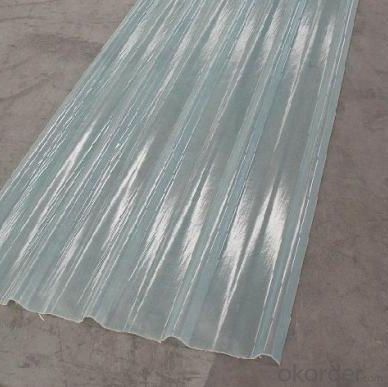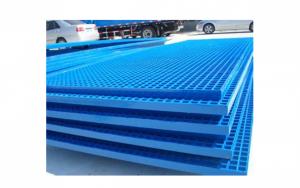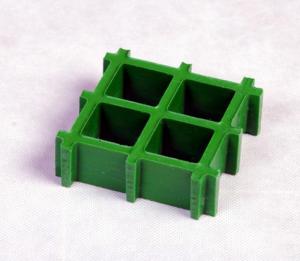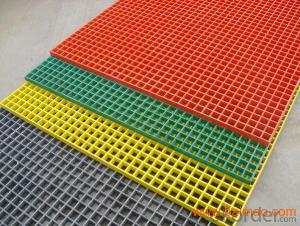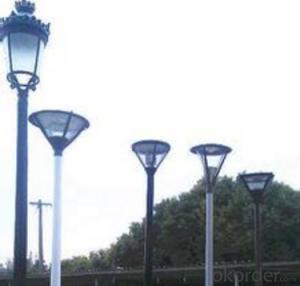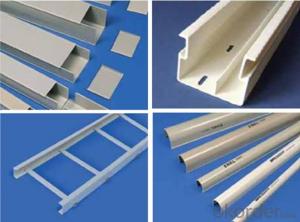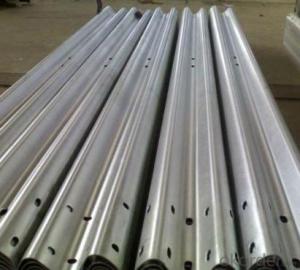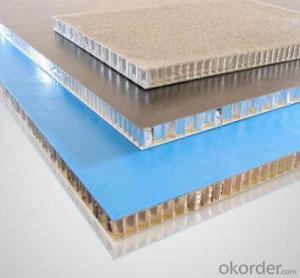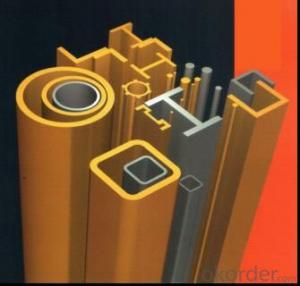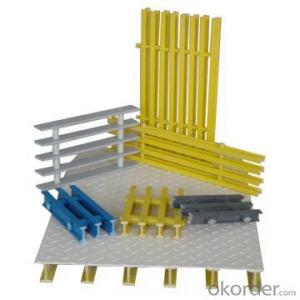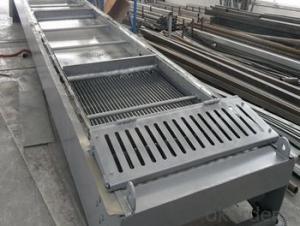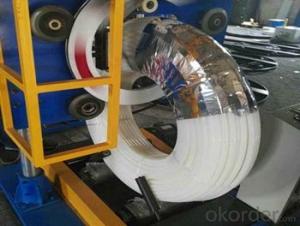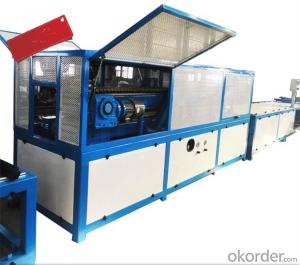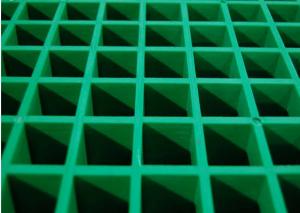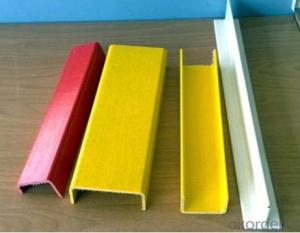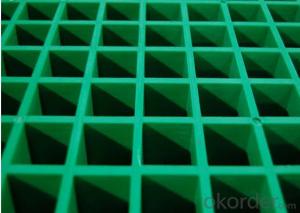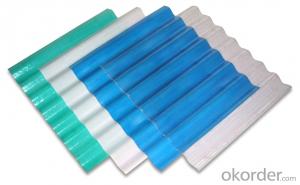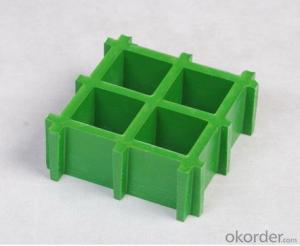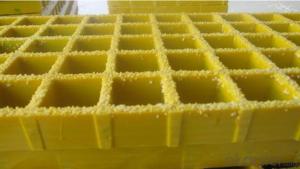FRP Pultrusion Profiles with Excellent Electromagnetism Property Pultruded Gratings
- Loading Port:
- Tianjin
- Payment Terms:
- TT OR LC
- Min Order Qty:
- 20000 m.t.
- Supply Capability:
- 300000 m.t./month
OKorder Service Pledge
OKorder Financial Service
You Might Also Like
Specification
PRODUCT DESCRIPTION
Pultruded grating is made by a particular assembly process, which using “I” shape as its main load-bearing and special rod to go through the bearing bar. Pultruded grating include the standard grating and the custom grating, the custom grating can be designed to meet customer’s requirement or special using condition by changing the shape, size and space of the bearing bars, the surface can be covered with lozenge panel, grit panel, or added the anti-slippery sand directly.
FRP pultruded grating has the most characteristics of molded grating, but it has its distinct advantages, it has very high fiberglass content in the loading direction, so it has very high load capability, it has more superiority when used at wide span, so that the basic support will be decreased and the project cost will be reduced accordingly.
SPECIFICATION
Thickness (mm) | Bar width (mm) | Open space (mm) | Open rate (%) | Approx weight (kg/m |
25.4 | 15.2 | 22.8 | 60 | 13.2 |
25.4 | 15.2 | 15.2 | 50 | 15.9 |
25.4 | 15.2 | 10.1 | 40 | 18.5 |
25.4 | 40 | 10.8 | 21 | 14.5 |
38.1 | 15.2 | 22.8 | 60 | 15.8 |
38.1 | 15.2 | 15.2 | 50 | 19.1 |
38.1 | 15.2 | 10.1 | 40 | 22.4 |
50.8 | 25.4 | 25.4 | 50 | 16.6 |
50.8 | 25.4 | 12.7 | 33 | 21.1 |
CHOICE FOR PULTRUDED GRATING
Resin: GP resin, ISO resin, VE resin, Phenol resin
Color choice: Yellow, gray, green, custom color
Surface choice: Groove surface, grit surface, lozenge cover surface
FEATURES
a. Anti-corrosion and anti-rust
b. Light weight and high strength
c. Anti-flammable
d. Anti- fatigue
e. Safe and anti-slippery
f. Anti-ageing
g. Easy of maintenance
h. Excellent electromagnetism property
i. Good economic benefit
FIELDS SERVED
Sewage treatment,
water supply and drainage,
chemical industry,
oil industry,
power engineering,
pulp and paper,
construction engineering,
spinning, marine engineering.
APPLICATION
Operation terrace,
stair walkway,
ground floor,
trench cover,
sidewalk,
foot bridge,
equipment safety fence,
scaffold.
COMPANT DESCRIPTION
CNBM,China National Building Materials Group is a state-owned enterprise in charge of administrative affairs in china building materials industry. Established in 1984, CNBM is a large group corporation of building materials with total assets of 25 billion RMB and a total staff of 30,000.CNBM now owns 200 subordinating firms of solely owned and joint-venture companies.
CNBM International Corporation is one subsidiary of CNBM, we focus on offering good-quality products,professional service and complete solution to our customers. Strong delivery capacity, advanced technology& management, strong financing capability and excellent after-sale service are our advantages in sharing international market.
FAQ
1.Q:Are you factory or trading company ?
A:We are Factory produce FRP machines and FRP products.
2.Q:If can customized by customers requirements?
A:yes,we can produce the machine with customized size.
3.Q:How about the payment?
A:We accept any kind of payment.
4.Q:What is the guarantee?
A:Gurantee is one year.
5.Q:If you can training?
A:yes ,we can training in our factory also can send engineers to your factory training.
PICTURES
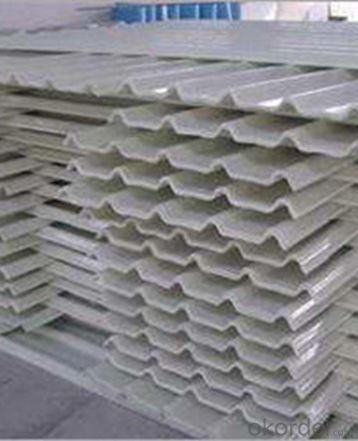
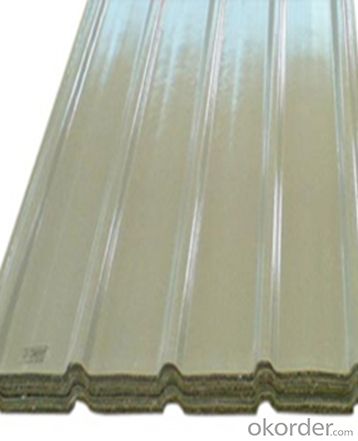
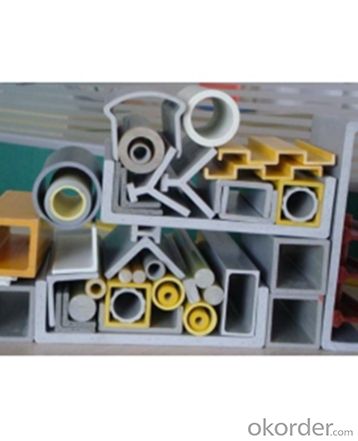
- Q: How do FRP pultrusion profiles perform in extreme heat temperatures?
- FRP pultrusion profiles are known for their excellent performance in extreme heat temperatures. The unique combination of materials used in the pultrusion process, such as fiberglass reinforcement and thermosetting resin matrix, imparts remarkable heat resistance properties to the profiles. One of the key advantages of FRP pultrusion profiles is their ability to maintain dimensional stability under high temperatures. Unlike traditional materials like steel or aluminum, which can expand or deform when exposed to extreme heat, FRP profiles retain their shape and structural integrity. This makes them highly reliable in applications where temperature fluctuations are common or where the profiles are exposed to intense heat. Additionally, FRP pultrusion profiles exhibit excellent thermal insulation properties. They have a low thermal conductivity, which means they can effectively resist the transfer of heat. This is beneficial in situations where heat needs to be controlled or isolated, preventing the profiles from becoming excessively hot. Furthermore, FRP pultrusion profiles have a high heat distortion temperature (HDT). HDT is the temperature at which a material starts to deform under a specific load. The HDT of FRP profiles is typically much higher than that of other materials, allowing them to withstand extreme heat without losing their structural integrity. Overall, FRP pultrusion profiles are well-suited for use in extreme heat temperatures. Their ability to maintain dimensional stability, resist heat transfer, and withstand high temperatures makes them a reliable choice for various industries, including aerospace, automotive, and infrastructure.
- Q: Can FRP pultrusion profiles be used in telecommunications applications?
- Telecommunications applications can utilize FRP pultrusion profiles, which offer a range of advantages that render them suitable for such infrastructure. To begin with, these profiles possess the desirable combination of being lightweight and strong, making them an excellent choice for supporting antennas, cable trays, and equipment racks. Their high strength-to-weight ratio enables easier installation and transportation while providing the necessary structural support. Moreover, FRP pultrusion profiles display corrosion resistance, a crucial characteristic for telecommunications applications. Given the exposure of telecommunications infrastructure to harsh environments like moisture, chemicals, and extreme temperatures, FRP's non-corrosive properties guarantee long-term durability and reliability, distinguishing it from traditional materials such as steel or wood. Additionally, FRP pultrusion profiles offer electrical insulation properties, which are vital in telecommunications applications. By not conducting electricity, they ensure safety in areas where electrical equipment is present. This feature prevents electrical interference and preserves the integrity of the telecommunications system. Furthermore, FRP pultrusion profiles can be customized to meet specific design requirements, as they can be manufactured in various shapes and sizes. This flexibility allows for the efficient design of telecommunications infrastructure, making FRP pultrusion profiles suitable for a wide range of applications within the industry. In conclusion, FRP pultrusion profiles prove to be well-suited for telecommunications applications due to their lightweight yet strong nature, corrosion resistance, electrical insulation properties, and customization possibilities. These attributes guarantee their reliability in supporting and protecting telecommunications infrastructure.
- Q: Are FRP pultrusion profiles resistant to chemicals used in semiconductor manufacturing?
- Yes, FRP (Fiber Reinforced Plastic) pultrusion profiles are generally resistant to the chemicals used in semiconductor manufacturing. FRP is known for its excellent chemical resistance, making it a suitable material for various industrial applications, including the semiconductor industry. The composite structure of FRP, consisting of a reinforced fiber matrix embedded in a polymer resin, provides resistance to a wide range of chemicals, including acids, alkalis, solvents, and other aggressive substances commonly used in semiconductor manufacturing processes. This resistance ensures that FRP pultrusion profiles can withstand exposure to these chemicals without significant degradation or corrosion, making them a reliable choice for use in semiconductor manufacturing environments. However, it is always advisable to consult the specific chemical resistance data provided by the manufacturer to ensure compatibility with the exact chemicals and concentrations used in a particular semiconductor manufacturing process.
- Q: Can FRP pultrusion profiles be used in the telecommunications and data communication industry?
- Yes, FRP (Fiber Reinforced Plastic) pultrusion profiles can be used in the telecommunications and data communication industry. FRP pultruded profiles have several advantages that make them suitable for use in this industry. Firstly, FRP pultrusion profiles offer excellent electrical insulation properties, making them ideal for applications in the telecommunications and data communication industry where electrical conductivity needs to be minimized. FRP profiles do not conduct electricity, ensuring that there are no interference or grounding issues that could disrupt the transmission of data. Secondly, FRP pultrusion profiles are lightweight yet strong, providing a high strength-to-weight ratio. This makes them suitable for use in the construction of communication towers, antenna supports, and satellite dish mountings, where the profiles need to withstand wind loads and other environmental stresses. Additionally, FRP profiles have excellent corrosion resistance, which is crucial in the telecommunications and data communication industry where equipment is often exposed to harsh outdoor environments. Unlike traditional materials such as steel or aluminum, FRP profiles do not rust or corrode, ensuring the longevity and reliability of the infrastructure. Furthermore, FRP profiles can be easily customized and manufactured in various shapes and sizes to meet the specific requirements of telecommunications and data communication applications. This flexibility allows for the design and construction of complex structures that can accommodate different equipment and technologies. Overall, FRP pultrusion profiles offer a range of benefits that make them well-suited for use in the telecommunications and data communication industry. Their electrical insulation properties, lightweight yet strong nature, corrosion resistance, and flexibility in design make them a reliable choice for supporting infrastructure in this sector.
- Q: Can FRP pultrusion profiles be used in the construction of train or subway platforms?
- Yes, FRP (Fiber Reinforced Polymer) pultrusion profiles can be used in the construction of train or subway platforms. FRP pultrusion profiles are made of a combination of reinforced fibers and a polymer resin matrix, which gives them high strength and durability. These profiles are lightweight, corrosion-resistant, and have excellent mechanical properties, making them suitable for various applications in the construction industry. When it comes to train or subway platforms, FRP pultrusion profiles can be used for various structural components such as handrails, guardrails, gratings, and decking systems. These profiles provide a non-conductive and non-magnetic solution, which is essential in railway environments to prevent interference with electrical and signaling systems. Furthermore, FRP pultrusion profiles offer a high level of customization, allowing them to be tailored to specific project requirements. They can be manufactured in various shapes, sizes, and colors to meet the aesthetic and functional needs of train or subway platforms. Moreover, FRP pultrusion profiles have excellent resistance to environmental factors such as moisture, chemicals, and UV radiation. This resistance ensures that the profiles remain durable and maintain their structural integrity over time, even in harsh and corrosive conditions commonly found in railway environments. Overall, FRP pultrusion profiles are a reliable and cost-effective choice for the construction of train or subway platforms. They provide numerous advantages including strength, durability, customization options, and resistance to environmental factors, making them a suitable alternative to traditional materials in these applications.
- Q: What is the fatigue resistance of FRP pultrusion profiles?
- The fatigue resistance of FRP pultrusion profiles refers to their ability to withstand repeated or cyclic loading without experiencing failure or degradation over time. FRP (Fiber Reinforced Polymer) pultrusion profiles are known for their exceptional fatigue resistance compared to other traditional materials such as steel or aluminum. The fatigue resistance of FRP pultrusion profiles can be attributed to the nature of the composite material itself. FRP profiles are typically made by impregnating continuous fibers, such as fiberglass or carbon fiber, with a polymer resin matrix. This combination of fibers and resin creates a material that exhibits high strength-to-weight ratio, excellent corrosion resistance, and superior fatigue properties. The fiber reinforcement in FRP profiles provides them with inherent resistance against fatigue. The continuous fibers distribute and absorb stresses more evenly, preventing the formation and propagation of cracks or defects that can lead to failure. Additionally, the polymer resin matrix acts as a protective layer, shielding the embedded fibers from environmental factors that could degrade their fatigue resistance. The fatigue resistance of FRP pultrusion profiles can be further enhanced through specific design considerations and manufacturing techniques. For example, the orientation and arrangement of the fibers within the profile can be optimized to improve the load-carrying capacity and fatigue life. Additionally, the use of advanced resin systems and manufacturing processes can result in improved interfacial bonding between the fibers and the matrix, further enhancing the fatigue resistance. Overall, FRP pultrusion profiles are renowned for their exceptional fatigue resistance. This makes them an ideal choice for applications that require long-term durability and resistance to cyclic loading, such as infrastructure components, aerospace structures, marine applications, and sporting goods.
- Q: Will the FRP section crack for a long time?
- Under normal circumstances, glass fiber reinforced plastic profiles will not appear cracking phenomenon, if there is cracking phenomenon, may be the following reasons:1, the placement method is incorrect, such as irregular, non closed section of a large number of stacked2 、 the resin content in the profile is low, filling is more (see if the section color is whiter, and more powder fall off at the same time)
- Q: What are the quality control measures for FRP pultrusion profiles?
- Quality control measures for FRP pultrusion profiles involve a series of steps and processes to ensure the products meet the desired standards. These measures include: 1. Raw material inspection: The first step is to verify the quality of the raw materials used in the pultrusion process. This includes checking the properties and specifications of the fiberglass, resin, additives, and other components. 2. Process control: Throughout the pultrusion process, various parameters need to be monitored and controlled. This includes maintaining consistent temperature, pressure, and resin content during the impregnation, forming, and curing stages. 3. Sample testing: Regular sampling is conducted during production to assess the quality of the profiles. These samples are tested for mechanical properties, dimensional accuracy, and surface finish to ensure they meet the required standards. 4. Visual inspection: Each profile is visually inspected to identify any defects, such as cracks, voids, delamination, or surface imperfections. Visual inspection helps to identify any irregularities that may affect the structural integrity or aesthetics of the profiles. 5. Mechanical testing: Profiles are subjected to mechanical testing to assess their strength, stiffness, and other mechanical properties. This involves conducting tests like flexural testing, tensile testing, impact testing, and compression testing. The results are compared to the specified requirements to determine if the profiles meet the necessary standards. 6. Quality documentation: Proper documentation is maintained throughout the manufacturing process, including records of raw material specifications, process parameters, test results, and inspection reports. This ensures traceability and provides a reference for quality assurance. 7. Non-destructive testing: In addition to mechanical testing, non-destructive testing techniques, such as ultrasonic testing or X-ray inspection, may be used to identify internal defects or inconsistencies without damaging the profiles. 8. Quality audits: Regular internal and external audits are conducted to assess the effectiveness of the quality control measures and ensure compliance with relevant industry standards and regulations. By implementing these quality control measures, manufacturers can ensure that FRP pultrusion profiles meet the required specifications, resulting in reliable and high-quality products.
- Q: Do FRP pultrusion profiles require any special tools for installation?
- Installation of FRP pultrusion profiles necessitates the use of specialized tools. These profiles are manufactured through a continuous process wherein fibers are drawn through a resin bath and subsequently into a heated die, resulting in a material that is not only strong and lightweight but also resistant to corrosion. To ensure the proper installation of FRP pultrusion profiles, various specific tools are commonly employed. These tools encompass: 1. Cutting Tools: During installation, it may be necessary to cut FRP profiles to specific lengths. To achieve clean and precise cuts, specialized cutting tools like high-speed saws or abrasive wheels are frequently utilized. 2. Drilling Tools: For the insertion of fasteners or other fittings, it might be necessary to drill holes in FRP profiles. To prevent damage to the profile while creating these holes, special drill bits designed for working with composite materials are typically employed. 3. Fastening Tools: Depending on the application, it may be necessary to fasten FRP profiles to other surfaces or structures. Commonly used fasteners include stainless steel screws, bolts, or adhesives, which are specifically chosen for their ability to securely hold the profiles in place. 4. Joining Tools: In certain instances, it may be necessary to join FRP profiles together in order to create longer lengths or more intricate shapes. To ensure a robust and secure connection, special joining techniques such as bonding, riveting, or the use of mechanical connectors are employed. It should be noted that the specific tools required for installation may vary depending on factors such as the complexity and size of the project, as well as the recommendations provided by the manufacturer. Therefore, it is always advisable to consult the manufacturer's installation guidelines or seek professional assistance to ensure the proper installation and optimal performance of FRP pultrusion profiles.
- Q: Is the test standard for FRP pultruded profiles and FRP gratings the same?
- Not the same. You can consult Hao Hao testing company (national level)
Send your message to us
FRP Pultrusion Profiles with Excellent Electromagnetism Property Pultruded Gratings
- Loading Port:
- Tianjin
- Payment Terms:
- TT OR LC
- Min Order Qty:
- 20000 m.t.
- Supply Capability:
- 300000 m.t./month
OKorder Service Pledge
OKorder Financial Service
Similar products
Hot products
Hot Searches
Related keywords
